Exploring Sustainability in Startups: A Systematic PRISMA Review
Abstract
1. Introduction
- Research question 1 (RQ1): What role does sustainability (economic, environmental, or social) play in startup operations?
- Research question 2 (RQ2): How do sustainability practices influence the business growth of startups?
- Research question 3 (RQ3): What are the most common sustainability dimensions (economic, environmental, social) emphasised in startups according to the existing literature?
- Research question 4 (RQ4): What are the challenges experienced by startups in integrating sustainable practices into their business models?
- Research question 5 (RQ5): What evidence exists regarding the relationship between sustainability adoption and startup performance?
2. Theoretical Foundations
2.1. Economic Sustainability
2.2. Environmental Sustainability
2.3. Social Sustainability
3. Materials and Methods
3.1. The PRISMA Approach
3.1.1. Database Identification and Searching
3.1.2. Screening
3.1.3. Eligibility
3.1.4. Inclusion and Exclusion Criteria
4. Results and Discussion
4.1. Study Characteristics
4.2. Publication of Articles by Year
4.3. Articles by Country from 2019 to 2024
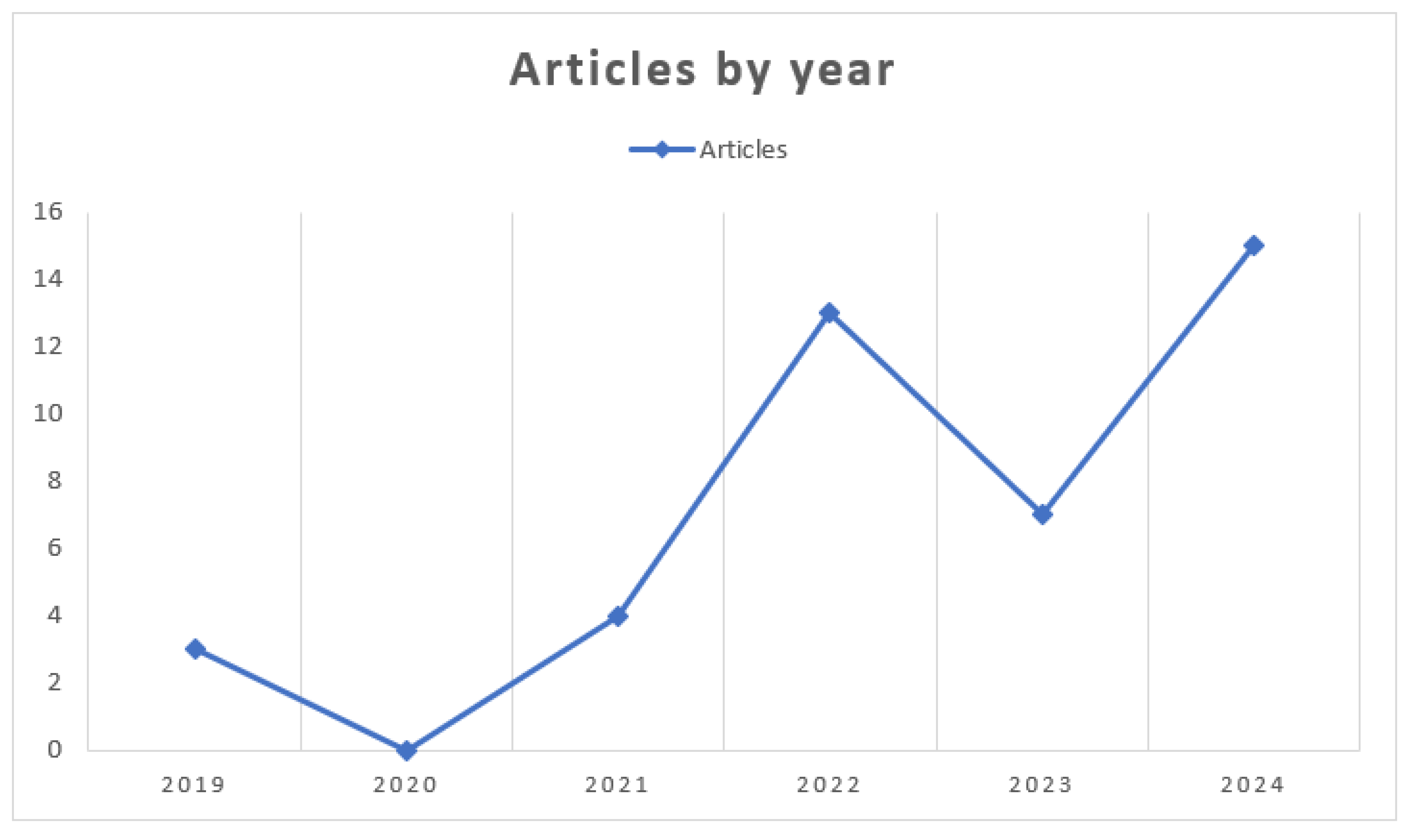
4.4. Articles by Subject Area
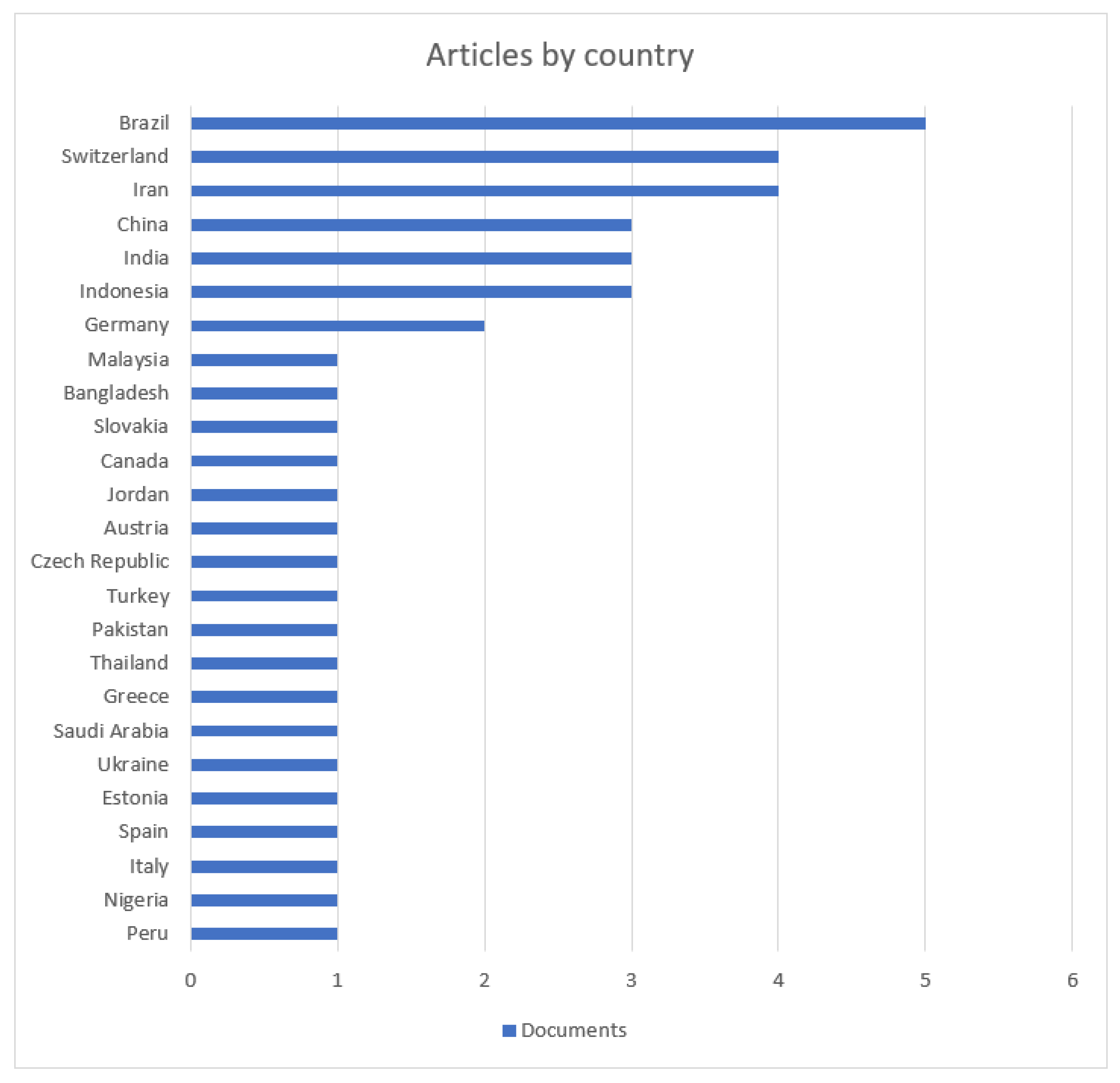
4.5. Contribution of Startups to the GDPs of the Countries with Literature Reviewed
4.6. Representation of Sustainability Values (Economic, Environmental, and Social) Across Reviewed Papers
4.7. Content Analysis
4.7.1. Economic Dimension
Access to Funding
Costs Savings
Innovation
4.7.2. Environmental Dimension
4.7.3. Social Dimension
4.7.4. Effect on Startup Growth
Studies Highlighting the Positive Effect of Innovation
Studies Highlighting the Effect of Integrating Social and Environmental Objectives
4.7.5. Challenges Faced by Startups Fulfilling Economic, Environmental, and Social Values of Sustainability
Financial Barriers
Regulatory Hurdles
Market Competition
Technological Limitation
Organisational Culture
Supply Chain Complexities
Limited Access to Sustainability Data
Limited Knowledge
Integration of Sustainability and Business Strategy
4.7.6. The Relationship Between Sustainability Adoption and Startup Performance
4.7.7. Theory Alignment
Alignment with Economic Integration
Alignment with Environmental Integration
Alignment with Social Integration
5. Implications of Study Findings for Policy and Practice
Development of a Conceptual Model
6. Conclusions
6.1. Limitations of This Study
6.2. Future Directions of This Study
Author Contributions
Funding
Institutional Review Board Statement
Informed Consent Statement
Data Availability Statement
Conflicts of Interest
References
- Lorek, S.; Spangenberg, J.H. Sustainable consumption within a sustainable economy: Beyond green growth and green economies. J. Clean. Prod. 2014, 63, 33–44. [Google Scholar] [CrossRef]
- Surmanidze, N.; Beridze, M.; Amashukeli, M.; Tskhadadze, K. Empowering small businesses in Georgia: Access to finance, economic resilience, and sustainable growth. Agora Int. J. Econ. Sci. 2023, 17, 158–169. [Google Scholar] [CrossRef]
- Petrakis, M. Entrepreneurial Integration of Sustainable Development in Business Practices. J. Energy Environ. Policy Options 2021, 4, 1–7. [Google Scholar]
- Ardi; Bernarto, I.; Margaretha Pink Berlianto, M.P.; Nanda, K.A. Empowering knowledge-based interaction in digital startup. Int. J. Data Netw. Sci. 2022, 6, 1274–1286. [Google Scholar] [CrossRef]
- Allal-Chérif, O.; Climent, J.C.; Berenguer, K.J.U. Born to be sustainable: How to combine strategic disruption, open innovation, and process digitization to create a sustainable business. J. Bus. Res. 2023, 154, 113379. [Google Scholar] [CrossRef]
- Hariram, N.P.; Mekha, K.B.; Suganthan, V.; Sudhakar, K. Sustainalism: An integrated socio-economic-environmental model to address sustainable development and sustainability. Sustainability 2023, 15, 10682. [Google Scholar] [CrossRef]
- Amin-Chaudhry, A. Corporate social responsibility–from a mere concept to an expected business practice. Soc. Responsib. J. 2016, 12, 190–207. [Google Scholar] [CrossRef]
- Christodoulou, I.P.; Rizomyliotis, I.; Konstantoulaki, K.; Alfiero, S.; Hasanago, S.; Paolone, F. Investigating the key success factors within business models that facilitate long-term value creation for sustainability-focused start-ups. Bus. Ethics Environ. Responsib. 2024, 34, 936–950. [Google Scholar] [CrossRef]
- Costanza, R.; Patten, B.C. Defining and predicting sustainability. Ecol. Econ. 1995, 15, 193–196. [Google Scholar] [CrossRef]
- Trautwein, C. Sustainability impact assessment of start-ups e Key insights on relevant assessment challenges and approaches based on an inclusive, systematic literature review. J. Clean. Prod. 2021, 281, 125330. [Google Scholar] [CrossRef]
- Wooseung, L.; Boyoung, K. Business sustainability of start-ups based on government support: An Empirical Study of Korean Start-Ups. Sustainability 2019, 11, 4851. [Google Scholar] [CrossRef]
- Choi, S.; Ng, A. Environmental and economic dimensions of sustainability and price effects on consumer responses. J. Bus. Ethics 2011, 104, 269–282. [Google Scholar] [CrossRef]
- Dyllick, T.; Hockerts, K. Beyond the business case for corporate sustainability. Bus. Strategy Environ. 2002, 11, 130–141. [Google Scholar] [CrossRef]
- Slávik, Š.; Bednár, R.; Hudáková, I.M. The structure of the start-up business model qualitative analysis. Sustainability 2021, 13, 8386. [Google Scholar] [CrossRef]
- Salamzadeh, A.; Kawamorita, H. Startup companies: Life cycle and challenges. In Proceedings of the 4th International Conference on Employment, Education, and Entrepreneurship (EEE), Belgrade, Serbia, 14–16 October 2015. [Google Scholar] [CrossRef]
- Naradda, G.S.K.; Ekanayake, E.M.S.; Abeyrathne, G.A.K.N.J.; Prasanna, R.P.I.R.; Jayasundara, J.M.S.B.; Rajapakshe, P.S.K. A review of global challenges and survival strategies of small and medium enterprises (SMEs). Economies 2020, 8, 79. [Google Scholar] [CrossRef]
- Gómez-Prado, R.; Alvarez-Risco, A.; Cuya-Velásquez, B.B.; Arias-Meza, M.; Campos-Dávalos, N.; Juarez-Rojas, L.; Anderson-Seminario, M.D.L.M.; Del-Aguila-Arcentales, S.; Yáñez, J.A. Product innovation, market intelligence and pricing capability as a competitive advantage in the international performance of startups: Case of Peru. Sustainability 2022, 14, 10703. [Google Scholar] [CrossRef]
- Karani, C.; Mshenga, P. Steering the sustainability of entrepreneurial start-ups. J. Glob. Entrep. Res. 2021, 11, 223–239. [Google Scholar] [CrossRef]
- Rosenberg, J.F.R. ESG Influence on Luxury Brand Strategy: Examining the Impact of Sustainability Practices on Brand Reputation. Master’s Thesis, Universidade Catolica Portuguesa, Lisboa, Portugal, 2024. (In Portugal). [Google Scholar]
- Lv, W.D.; Tian, D.; Wei, Y.; Xi, R.X. Innovation resilience: A new approach for managing uncertainties concerned with sustainable innovation. Sustainability 2018, 10, 3641. [Google Scholar] [CrossRef]
- Bărbulescu, O.; Tecău, A.S.; Munteanu, D.; Constantin, C.P. Innovation of startups, the key to unlocking post-crisis sustainable growth in Romanian entrepreneurial ecosystem. Sustainability 2021, 13, 671. [Google Scholar] [CrossRef]
- Prihadyanti, D.; Aziz, S.A. Indonesia toward sustainable agriculture–Do technology-based start-ups play a crucial role? Bus. Strategy Dev. 2023, 6, 140–157. [Google Scholar] [CrossRef]
- Wagner, S.M. Startups in the supply chain ecosystem: An organizing framework and research opportunities. Int. J. Phys. Distrib. Logist. Manag. 2021, 51, 1130–1157. [Google Scholar] [CrossRef]
- Koch, L.L.; Tonial, G.; Sehnem, S.; Peres, W.D.G. Sustainable entrepreneurship and digital technologies: Challenges and potential aspects for Brazilian agtechs. BAR-Braz. Adm. Rev. 2024, 21, e230125. [Google Scholar] [CrossRef]
- Sreenivasan, A.; Suresh, M. Factors influencing sustainability in start-ups operations 4.0. Sustain. Oper. Comput. 2023, 4, 105–118. [Google Scholar] [CrossRef]
- Gutterman, A. Sustainable Finance and Impact Investment: A Guide for Sustainable Entrepreneurs. 2024. Available online: https://ssrn.com/abstract=4944162 (accessed on 8 May 2025).
- Alhaddi, H. Triple Bottom Line and Sustainability: A Literature Review. Bus. Manag. Stud. 2015, 1, 6. [Google Scholar] [CrossRef]
- Elkington, J. Cannibals with Forks: The Triple Bottom Line of 21st Century Business; Capstone: Oxford, UK, 1997. [Google Scholar]
- Gimenez, C.; Sierra, V.; Rodon, J. Sustainable operations: Their impact on the triple bottom line. Int. J. Prod. Econ. 2012, 140, 149–159. [Google Scholar] [CrossRef]
- Wilson, J.P. The triple bottom line Undertaking an economic, social, and environmental retail sustainability strategy. Int. J. Retail. Distrib. Manag. 2015, 43, 432–447. [Google Scholar] [CrossRef]
- Mancin, S.; Sguanci, M.; Andreoli, D.; Soekeland, F.; Anastasi, G.; Piredda, M.; De Marinis, M.G. Systematic review of clinical practice guidelines and systematic reviews: A method for conducting comprehensive analysis. MethodsX 2024, 12, 102532. [Google Scholar] [CrossRef] [PubMed]
- Martins de Souza, A.; Puglieri, F.N.; de Francisco, A.C. Competitive advantages of sustainable startups: Systematic literature review and future research directions. Sustainability 2024, 16, 7665. [Google Scholar] [CrossRef]
- Haddaway, N.R.; Page, M.J.; Pritchard, C.C.; McGuinness, L.A. PRISMA2020: An R package and Shiny app for producing PRISMA 2020-compliant flow diagrams, with interactivity for optimised digital transparency and open synthesis. Campbell Syst. Rev. 2022, 18, e1230. [Google Scholar] [CrossRef] [PubMed]
- Page, M.J.; McKenzie, J.E.; Bossuyt, P.M.; Boutron, I.; Hoffmann, T.C.; Mulrow, C.D.; Shamseer, L.; Tetzlaff, J.M.; Akl, E.A.; Brennan, S.E.; et al. The PRISMA 2020 statement: An updated guideline for reporting systematic reviews. Res. Methods Report. 2021, 372, n71. [Google Scholar] [CrossRef]
- Bhatnagar, M.; Taneja, S.; Özen, E. A wave of green start-ups in India—The study of green finance as a support system for sustainable entrepreneurship. Green Financ. 2022, 4, 253–273. [Google Scholar] [CrossRef]
- Aguilar-Esteva, V.; Acosta-Banda, A.; Carreño Aguilera, R.; Patiño Ortiz, M. Sustainable social development through the use of artificial intelligence and data science in education during the COVID emergency: A Systematic Review using PRISMA. Sustainability 2023, 15, 6498. [Google Scholar] [CrossRef]
- Petrů, N.; Pavlák, M.; Polák, J. Factors impacting startup sustainability in the Czech Republic. Innov. Mark. 2019, 15, 1–16. [Google Scholar] [CrossRef]
- Mets, T.; Vettik-Leemet, P. Women in the sustainability new ventures in the digital era: Out from the shadow of the small country male-dominated startup ecosystem. Green Financ. 2024, 6, 383–406. [Google Scholar] [CrossRef]
- Wahyuni, A.I.; Noviaristanti, S. Startup characteristics and the role of business incubators in Indonesia. Indones. J. Bus. Entrep. 2022, 8, 251–262. [Google Scholar] [CrossRef]
- Wu, J.; Zhang, Y.; Ding, Q.Q. Path and boundary of the influence of social entrepreneurial opportunity identification on the growth of commercial startups. Front. Environ. Sci. 2022, 10, 1027093. [Google Scholar] [CrossRef]
- Spadoni, R.; Nanetti, M.; Bondanese, A.; Rivaroli, S. Innovative solutions for the wine sector: The role of startups. Wine Econ. Policy 2019, 8, 165–170. [Google Scholar] [CrossRef]
- Sreenivasan, A.; Suresh, M. Sustainability-controlled measures for resilient management of fresh and short food startups supply chain. Sustain. Manuf. Serv. Econ. 2024, 3, 2–14. [Google Scholar] [CrossRef]
- Sreenivasan, A.; Suresh, M. Digital transformation in start-ups: A bibliometric analysis. Digit. Transform. Soc. 2023, 2, 276–292. [Google Scholar] [CrossRef]
- Hota, S.L.; Mohanty, N.; Kumar, A.; Panda, K. Achieving sustainability in newly founded start-up businesses: Navigating challenges and gaining insights. Recoletos Multidiscip. Res. J. 2024, 12, 1–7. [Google Scholar] [CrossRef]
- Tajpour, M.; Hosseini, E.; Mohiuddin, M. Effects of innovative climate, knowledge sharing, and communication on sustainability of digital start-ups: Does social media matter? J. Open Innov. Technol. Mark. Complex. 2023, 9, 100053. [Google Scholar] [CrossRef]
- Rojas, A.; Tuomi, A. Reimagining the sustainable social development of AI for the service sector: The role of startups. J. Ethics Entrep. Technol. 2022, 2, 39–54. [Google Scholar] [CrossRef]
- da Silva Nunes, A.K.; Morioka, S.N.; Bolis, I. Challenges of business models for sustainability in startups. RAUSP Manag. J. 2022, 57, 382–400. [Google Scholar] [CrossRef]
- Aulia, M.F.; Alamanda, D.T.; Zuhdi, U.; Anggadwita, G.; Kurniati, D.M.; Soegoto, E.S. Enhancing startup business performance through iterativem strategies and lean programs: Insights from capital cities in Indonesia to unlock Central Asia’s potential. Australas. Account. Bus. Financ. J. 2024, 18, 165–183. [Google Scholar]
- Srisathana, W.A.; Worrakittikulc, W.; Rattanapon, K.; Hongtoa, T.; Na Sakhonnakona, A.P.; Naruetharadhol, P. Digitalisation to zero-waste: The interplay of open eco-innovation and the circular economy in agricultural enterprises. Int. J. Sustain. Eng. 2025, 18, 1–21. [Google Scholar] [CrossRef]
- Sultan, M.F. Evaluating the transformative influence of green startups on sustainable development in developing economies. Rev. Manag. Sci. 2023, 5, 70–82. [Google Scholar]
- Ostermann, C.M.; Nascimento, L.S.; Zen, A.C. Business model innovation for circular economy in Fashion Industry: A startups’ perspective. Front. Sustain. 2021, 2, 766614. [Google Scholar] [CrossRef]
- Kofanov, O.; Kofanova, O.; Tkachuk, K.; Tverda, O.; Shostak, I. Enhancement of the market attractiveness and success of startups on the circular economy and sustainability principles. Agric. Resour. Econ. Int. Sci. E-J. 2024, 10, 167–189. [Google Scholar] [CrossRef]
- Takas, N.; Kouloumpris, E.; Moutsianas, K.; Liapis, G.; Vlahavas, I.; Kousenidis, D. Startup sustainability forecasting with artificial intelligence. Appl. Sci. 2024, 4, 8925. [Google Scholar] [CrossRef]
- Piot-Lepetit, I. Digitainability and open innovation: How they change innovation processes and strategies in the agrifood sector? Front. Sustain. Food Syst. 2023, 7, 1267346. [Google Scholar] [CrossRef]
- Latif, H.H.; Gopalakrishnan, B.; Nimbarte, A.; Currie, K. Sustainability index development for manufacturing industry. Sustain. Energy Technol. Assess 2017, 24, 82–95. [Google Scholar] [CrossRef]
- Guan, X.; Yao, C.; Zhang, W. Sustainability of Entrepreneurship: An Empirical Study on the Impact Path of Corporate Social Responsibility Based on Internal Control. Sustainability 2023, 15, 12180. [Google Scholar] [CrossRef]
- Aliabadi, V.; Ataei, P.; Gholamrezai, S. Identification of the relationships among the indicators of sustainable entrepreneurial ecosystems in agricultural startups. J. Innov. Knowl. 2022, 7, 100245. [Google Scholar] [CrossRef]
- Alqahtani, A.Y. Investigation of startups’ sustainability: Empirical evidence from Saudi Arabia. Entrep. Sustain. Issues 2022, 10, 107–131. [Google Scholar] [CrossRef] [PubMed]
- Ghasemi, M.; Namdar Joyami, E.N. Identify and categorize the mentality of startup managers to digital entrepreneurship using Q methodology. Public Manag. Res. 2022, 15, 207–245. [Google Scholar] [CrossRef]
- Nag, I.; Manohar, S.; Mittal, A.; Nair, A.J. Thought clarity to execution chaos: A review on core competencies of grassroots entrepreneurs for instigation, growth and sustainability of startups. J. Innov. Entrep. 2024, 13, 2–26. [Google Scholar] [CrossRef]
- Hokmabadi, H.; Rezvani, S.M.H.S.; de Matos, C.A. Business resilience for small and medium enterprises and startups by digital transformation and the role of marketing capabilities. A Syst. Review. Syst. 2024, 12, 220. [Google Scholar] [CrossRef]
- Golshani, A.; Adab, H.; Sarabadani, A. Technology valuation strategies of Iranian startups. J. Value Creat. Bus. Manag. 2023, 3, 180–197. [Google Scholar] [CrossRef]
- Agu, E.E.; Iyelolu, T.V.; Idemudia, C.; Ijomah, T.I. Exploring the relationship between sustainable business practices and increased brand loyalty. Int. J. Manag. Entrep. Res. 2024, 6, 2463–2475. [Google Scholar] [CrossRef]
- Yi, H.; Meng, X.; Linghu, Y.; Zhang, Z. Can financial capability improve entrepreneurial performance? Evidence from rural China. Econ. Res.-Ekon. Istraživanja 2023, 36, 1631–1650. [Google Scholar] [CrossRef]
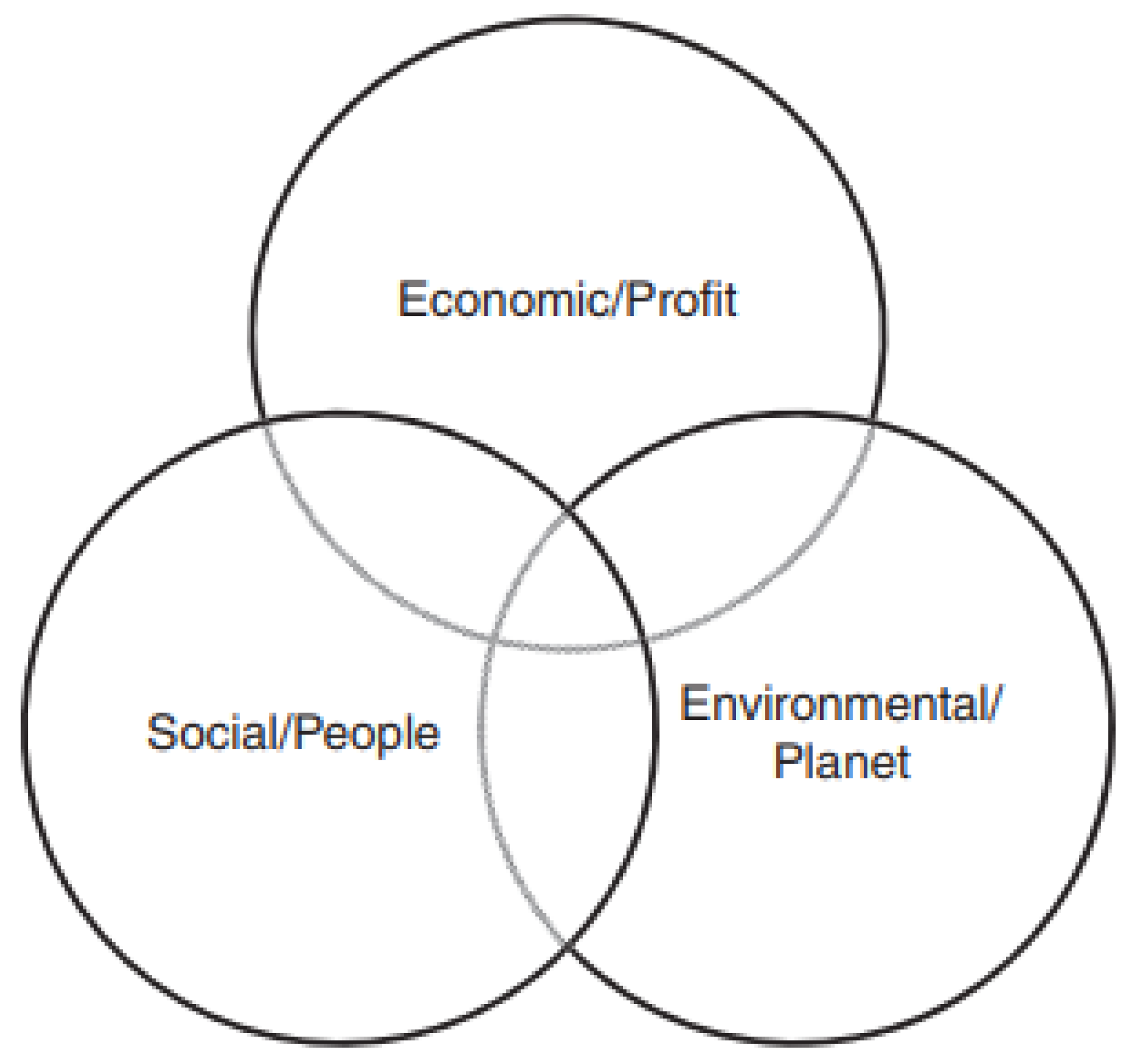
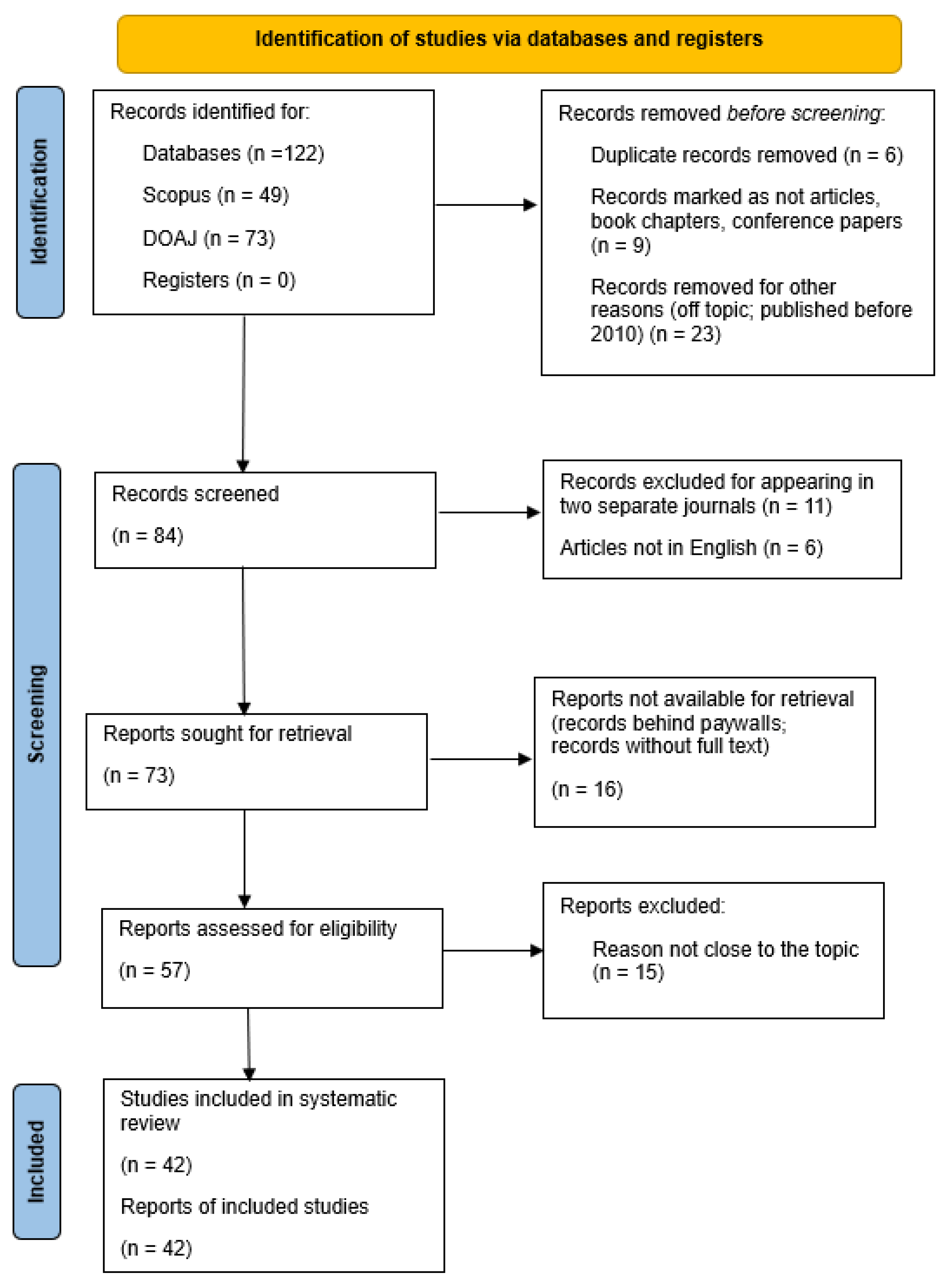
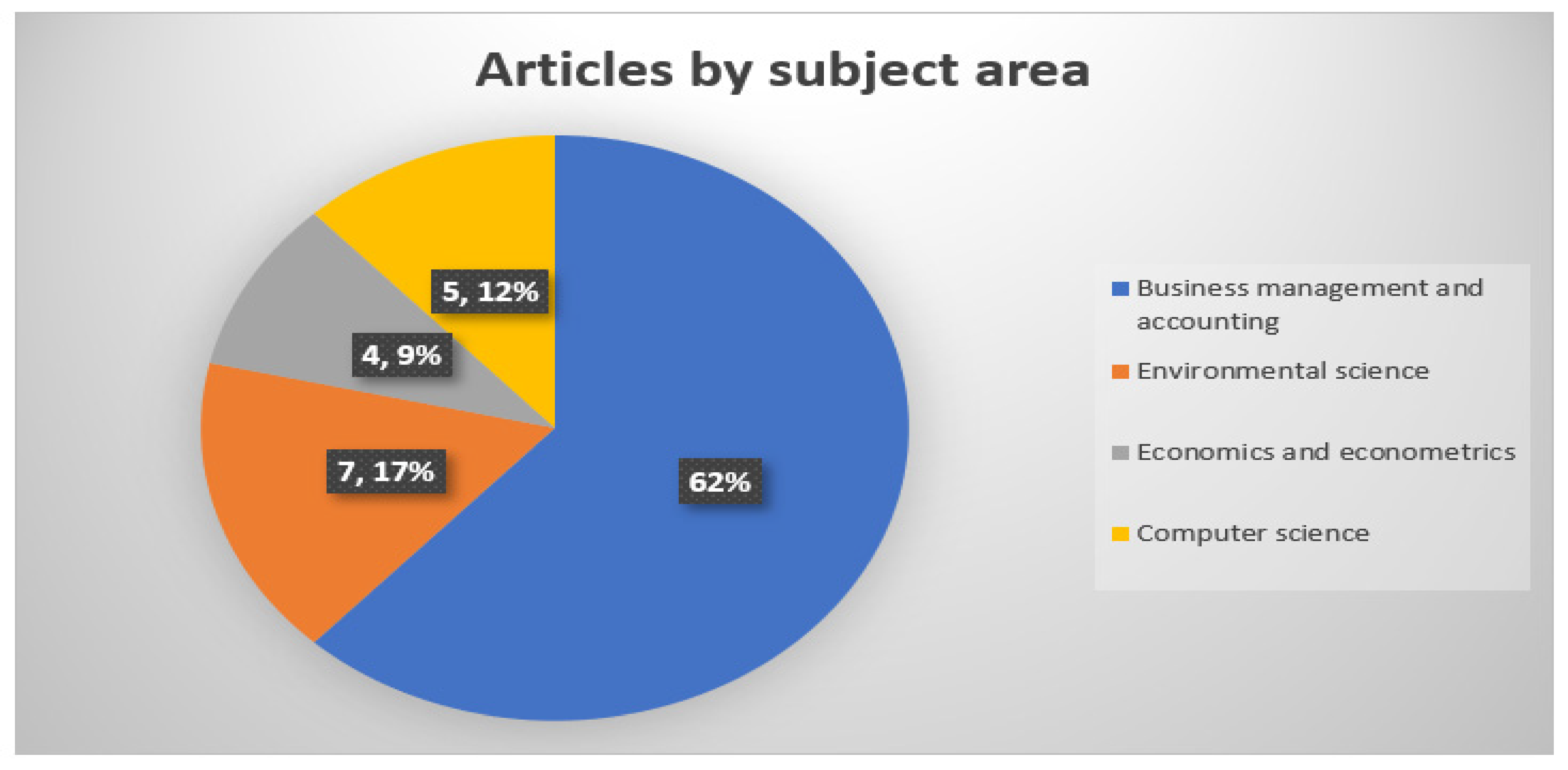
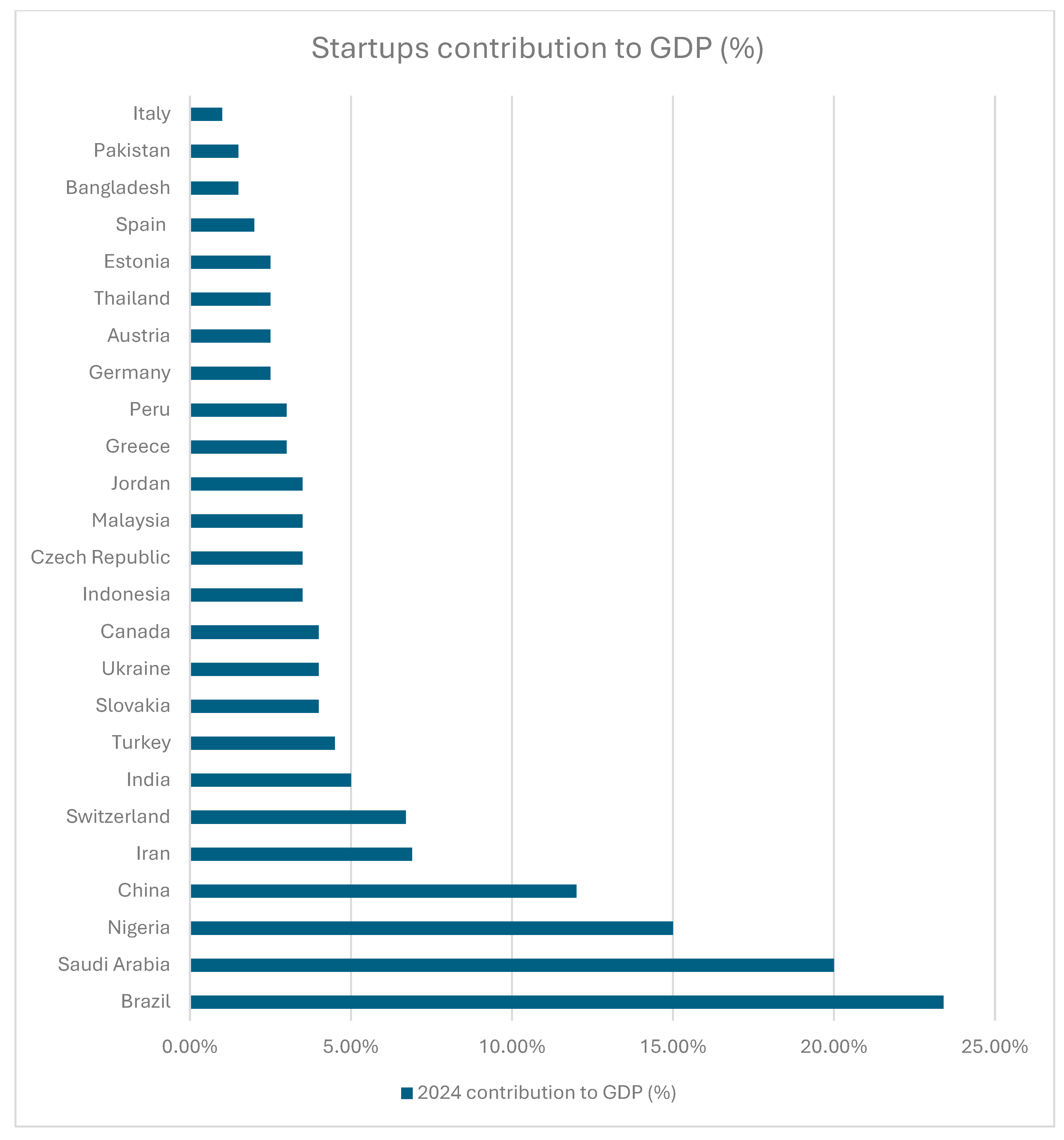
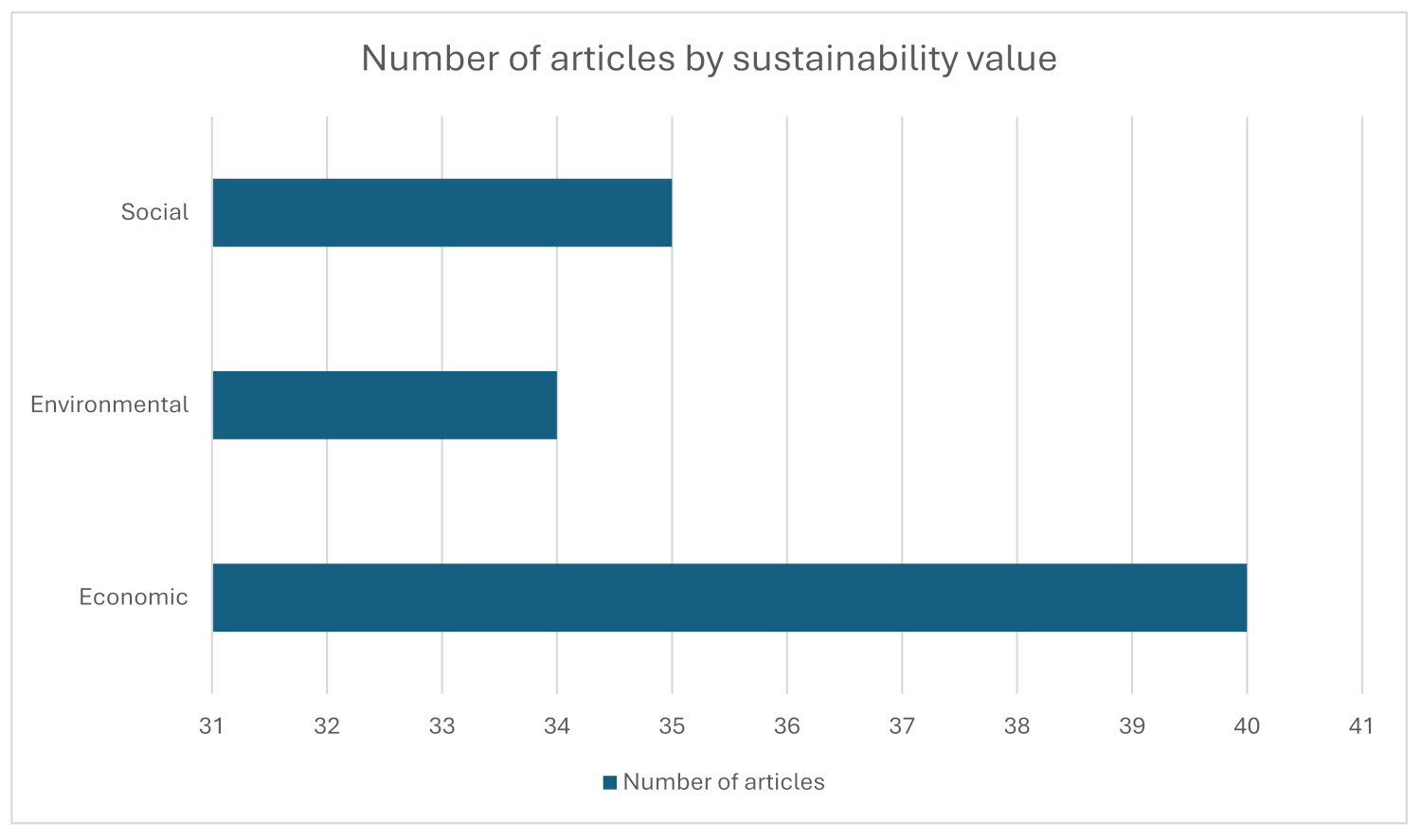
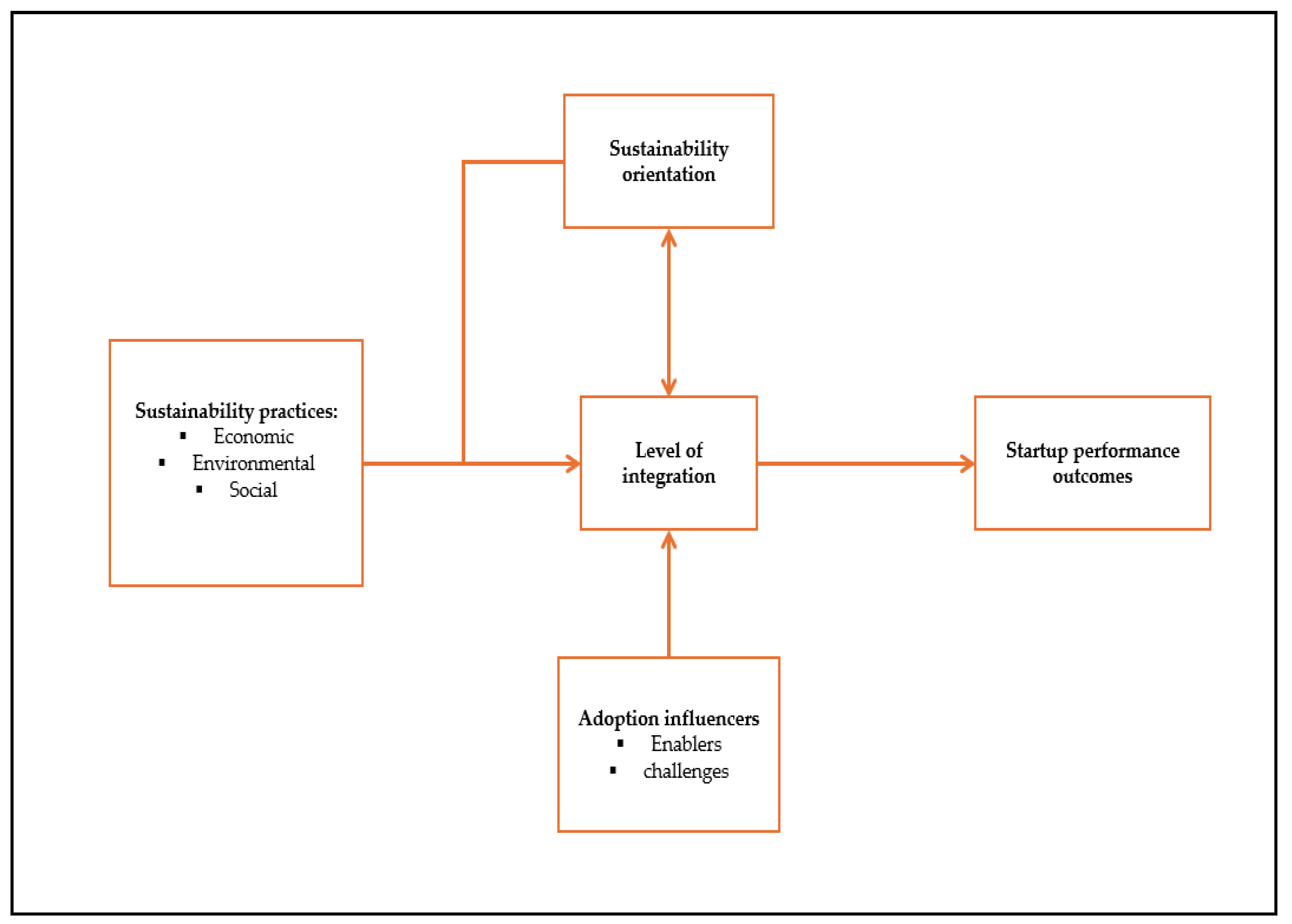
| Category | Value | Description | References |
|---|---|---|---|
| Economic value | Access to funding | Investors are becoming more interested in supporting startups that meet environmental and social governance goals. | [18,35,38,40]. |
| Costs savings | Startups can boost operational efficiency, lower expenses, and raise revenue through incorporating sustainable practices in their business models. | [25,41]. | |
| Innovation | The ability of startups to innovate and adapt has a significant impact on how well they perform when they embrace sustainability. | [38,39,40,43,44,45,49,54,58]. | |
| Environmental value | Waste minimisation and resource efficiency | Such alignment not only creates a good brand reputation but also draws environmentally conscious customers. | [35,50,53]. |
| Resource depletion and climate change | Sustainable entrepreneurship stimulates innovation by motivating startups to create solutions that tackle urgent environmental issues. | [24,42,54]. | |
| Creation of eco-friendly products | Rapid innovation enables startups to adapt quickly to changing consumer demands and environmental issues, which eventually improves their economic viability. | [24,40,49,52]. | |
| Social value | Enhances the business’s reputation | Enterprises create a good brand reputation and attract environmentally aware customers and investors. | [42,44,56] |
| Comply with legal and customer standards | Startups usually implement stringent certification programs and quality control processes to meet regulatory requirements and client expectations. | [42] | |
| Upholding worker rights and guaranteeing fair wage practices | Ethical and sustainable supply chains depend on upholding worker rights and guaranteeing fair wage practices. | [42,45,55]. |
| Category | Challenge | Description | References |
|---|---|---|---|
| Challenge | Financial barriers | Cash flow problems that many startups face exacerbate the financial obstacle, making it more challenging to set aside the required funds for sustainability projects. | [4,24,35,38,44,58]. |
| Regulatory hurdles | The dynamic nature of sustainability policies necessitates constant realignment, which strains the operational capabilities of startups. | [38,42,46,47,48]. | |
| Market competition | Startups compete not only with well-established and long-standing companies with greater resources, but also with other startups. | [24,25,32,52,54]. | |
| Technological limitation | Startups face poor access to advanced technologies, huge investment in technology, high implementation costs, and unfamiliarity with circular economy concepts. | [48,49,54,58]. | |
| Challenge | Organisational culture | The complex nature of social entrepreneurship requires that startups navigate complex stakeholder relationships. | [40,47,51,56,60,62]. |
| Supply chain complexities | Sourcing sustainable materials and making sure startups follow ethical standards is a challenging and resource-intensive task. | [42,47,54]. | |
| Limited access to sustainability data | Startups may find it more difficult to convince stakeholders of their compliance and performance due to inability to obtain reliable data on sustainability performance. | [52,53]. | |
| Limited knowledge | Most startups lack the necessary knowledge to implement sustainable practices effectively. | [14,24,37,48,50,61]. | |
| Integration of economic, environmental, and social values into the business strategy | The demands of integrating social value creation into business models can overwhelm startups. | [40] |
Disclaimer/Publisher’s Note: The statements, opinions and data contained in all publications are solely those of the individual author(s) and contributor(s) and not of MDPI and/or the editor(s). MDPI and/or the editor(s) disclaim responsibility for any injury to people or property resulting from any ideas, methods, instructions or products referred to in the content. |
© 2025 by the authors. Licensee MDPI, Basel, Switzerland. This article is an open access article distributed under the terms and conditions of the Creative Commons Attribution (CC BY) license (https://creativecommons.org/licenses/by/4.0/).
Share and Cite
Duve, M.; Marx, B. Exploring Sustainability in Startups: A Systematic PRISMA Review. Sustainability 2025, 17, 6475. https://doi.org/10.3390/su17146475
Duve M, Marx B. Exploring Sustainability in Startups: A Systematic PRISMA Review. Sustainability. 2025; 17(14):6475. https://doi.org/10.3390/su17146475
Chicago/Turabian StyleDuve, Munyaradzi, and Benjamin Marx. 2025. "Exploring Sustainability in Startups: A Systematic PRISMA Review" Sustainability 17, no. 14: 6475. https://doi.org/10.3390/su17146475
APA StyleDuve, M., & Marx, B. (2025). Exploring Sustainability in Startups: A Systematic PRISMA Review. Sustainability, 17(14), 6475. https://doi.org/10.3390/su17146475






